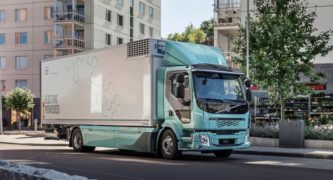
Founded in 1927, Volvo has a well-deserved reputation around the world for manufacturing safe and sturdy cars and trucks.
And now that it is about to roll out a new line of electric trucks next month from its main factory in Virginia, the company is demonstrating how regulatory and business trends will transform the trucking industry.
Volvo’s move toward building and selling Class 8 electric trucks in the U.S. is an important market signal, said Bill Van Amburg, executive vice president of Calstart, a Pasadena nonprofit clean transportation industry consortium.
“They are one of the biggest global makers of trucks and buses, and they have made a substantial financial and technical commitment to e-mobility,” Amburg said.
“They have a national service and support dealer network. Fleets know that they will be there tomorrow as a company,” Van Amburg said.
The Swedish manufacturer, which sells under the Volvo and Mack truck brands in North America, wants to shift its entire product range to vehicles that are zero-emissions or powered by renewable resources such as hydrotreated vegetable oil fossil-free by 2040, Peter Voorhoeve, president of Volvo Trucks North America, told Trucks.com.
Amid a growing body of global environmental regulations, low-emission zones and company sustainability goals, combined with an improving operational cost equation, the company is launching a long–term transition toward alternatively fueled commercial vehicles, Alistair Hayfield, a senior research director with Interact Analysis, wrote in a recent report.
Volvo and other legacy manufacturers want to be in a position to tap that market, starting to redirect capital from internal combustion engine development to zero-emission electric powertrains coupled to either a battery pack or a hydrogen fuel cell stack.
“2021 is the real beginning of the market scale-up phase for e-trucks,” Van Ambug said.
“That first hurdle has been product availability. Now we have crossed that line,” he said.
But it’s not just Volvo. The growing product roster includes Class 6 and Class 8 trucks from Peterbilt and Kenworth and Navistar’s Class 6 platform.
“Daimler’s Freightliner trucks will be ready by 2022. We also have interesting emerging players such as BYD, which is getting traction with its tractors, and Lion is scaling up production in medium-duty and HD trucks. And then there is Ford’s e-Transit; that is a van-size game-changer,” Van Amburg said.
Voorhoeve said that hydrogen fuel cell commercial trucks would likely become the preferred mode for long haul freight. That’s one reason why Volvo Group and Daimler Truck AG created a joint venture earlier this year to pursue the technology.
Each will apply it to their respective truck range and compete against each other, Voorhoeve said at the electric VNR launch last week. Volvo’s goal is to start selling electric trucks powered by hydrogen fuel cells in the second half of this decade.
Hayfield expects to see more moves like this.
“There will likely be a continuing shift away from investment in combustion engine technology and manufacturing. Only minimal levels of investment can be expected to keep plants operational or to allow the development of technologies that support future engine emission standards,” Hayfield said.
Volvo is targeting its VNR Electric at customers who have an operating range of about 150 miles. It is already in pilot programs hauling goods back and forth from Southern California’s port complex to inland distribution centers. Voorhoeve said typical customers would use them for regional distribution ranges, including food and beverage and pick-up and delivery routes.
The VNR has 264-kWh lithium-ion batteries, which charge up to 80 percent within 70 minutes. The electric powertrain is rated at 455 horsepower and generates up to 4,051 pound-feet of torque. The Volvo VNR Electric uses a two-speed Volvo I-Shift transmission. It needs a very low gear to start the truck into motion.
Volvo is already taking orders for the truck in three configurations. The base is a single-axle straight truck with a gross vehicle weight rating of 33,200 lbs. There are two tractor configurations – 4×2 with a 66,000-pound gross combination weight rating and 6×2 with an up-to 82,000-pound weight rating.
The truck maker will finance both the lease and purchase of the VNR Electric, including the funds needed to build charging infrastructure. It also is offing a contract that includes scheduled and preventative maintenance, towing and vehicle repair.














 0 comments
0 comments


